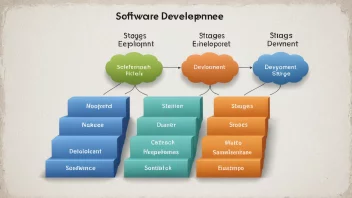Blockchain technology has quickly emerged as a revolutionary force, reshaping various industries, and real estate is no exception. By introducing decentralized, transparent, and immutable systems, blockchain has the potential to streamline real estate transactions, enhance security, and reduce fraud. This article explores the impact of blockchain on real estate transactions, detailing its benefits, challenges, and future implications for the industry.
Understanding Blockchain Technology
At its core, blockchain is a distributed ledger technology (DLT) that allows multiple parties to maintain a shared database without the need for a central authority. Each block in the blockchain contains a list of transactions, and once a block is filled, it is cryptographically linked to the previous block, forming a chain. This structure ensures that the data is immutable and can only be altered through consensus among network participants.
Key features of blockchain that are particularly relevant to real estate transactions include:
- Decentralization: Eliminates the need for intermediaries, reducing costs and enhancing transaction speed.
- Transparency: All participants can view the transaction history, promoting trust among parties.
- Security: Cryptographic hashing makes it extremely difficult to alter transaction data without detection.
- Smart Contracts: Self-executing contracts with the terms of the agreement directly written into code, automating and enforcing terms without intermediaries.
Benefits of Blockchain in Real Estate Transactions
1. Improved Efficiency
Traditional real estate transactions can be lengthy and cumbersome, often requiring multiple steps, including title searches, appraisals, and coordination among various parties. By utilizing blockchain, many of these steps can be streamlined:
- Faster Transactions: Blockchain can reduce the time it takes to close a deal by automating processes through smart contracts.
- Elimination of Redundancies: Title searches can be simplified as blockchain provides a single source of truth for property records.
2. Enhanced Security
Security is a significant concern in real estate, where fraud can lead to severe financial losses. Blockchain addresses these issues by offering:
- Immutable Records: Once recorded, property transactions cannot be altered, reducing the risk of fraud.
- Digital Identity Verification: Blockchain can facilitate secure identity verification processes, ensuring that all parties involved in a transaction are who they claim to be.
3. Increased Transparency
Transparency is crucial in real estate, where trust between buyers, sellers, and agents is paramount:
- Open Access: All transaction history is publicly accessible, fostering trust and accountability.
- Audit Trails: Blockchain provides a clear and verifiable audit trail, simplifying dispute resolution.
4. Cost Reduction
Blockchain can significantly reduce costs associated with real estate transactions:
- Lower Transaction Fees: By eliminating intermediaries such as brokers and banks, transaction fees can be reduced.
- Reduced Paperwork: Digital records minimize the need for physical paperwork, saving both time and money.
Challenges and Limitations of Blockchain in Real Estate
1. Regulatory Hurdles
Despite its potential, blockchain faces regulatory challenges. As a relatively new technology, many jurisdictions lack clear guidelines on how blockchain transactions should be treated legally. This uncertainty can hinder adoption.
2. Integration with Existing Systems
Integrating blockchain with existing real estate systems can be complex. Many stakeholders in the real estate industry are accustomed to traditional processes, and transitioning to a blockchain-based system requires overcoming significant inertia.
3. Technological Barriers
Not all parties involved in real estate transactions may have the necessary technical expertise to navigate blockchain technology. Education and training will be essential for successful implementation.
4. Scalability Issues
As blockchain networks grow, they must handle an increasing number of transactions. Some blockchain solutions face scalability issues that could impact their viability for high-volume real estate markets.
Real-World Applications of Blockchain in Real Estate
1. Propy
Propy is a global real estate marketplace that leverages blockchain technology to facilitate property transactions. By allowing buyers and sellers to transact directly, Propy reduces reliance on intermediaries and streamlines the purchasing process. Propy also utilizes smart contracts to automate transaction processes, ensuring that terms are met before funds are released.
2. Harbor
Harbor focuses on tokenizing real estate assets, allowing investors to purchase shares of properties through blockchain-based tokens. This innovation not only democratizes access to real estate investments but also enhances liquidity, as token holders can trade their shares on secondary markets.
3. Ubitquity
Ubitquity is a blockchain-based title and escrow platform that aims to simplify property transactions and improve transparency. By providing a secure and accessible way to manage property records, Ubitquity helps reduce the risk of fraud and ensures that all parties have access to accurate information.
Future Implications of Blockchain in Real Estate Transactions
The future of blockchain in real estate looks promising, with potential developments including:
- Wider Adoption: As more stakeholders recognize the benefits of blockchain, adoption is likely to increase, leading to a more efficient and secure real estate ecosystem.
- Regulatory Clarity: As governments and regulatory bodies begin to establish clearer guidelines, the legal landscape for blockchain in real estate will become more favorable.
- Innovative Solutions: New startups and technologies will continue to emerge, offering innovative solutions that leverage blockchain to address longstanding challenges in real estate.
Conclusion
Blockchain technology has the potential to transform the real estate industry by improving efficiency, enhancing security, increasing transparency, and reducing costs. While challenges remain, the benefits of blockchain are compelling, and its real-world applications are already demonstrating its efficacy. As the industry continues to evolve, it is essential for stakeholders to stay informed and adapt to this disruptive technology. The future of real estate transactions is likely to be reshaped by blockchain, paving the way for a more secure and efficient marketplace.






